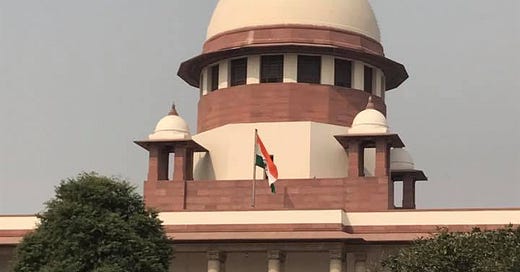Supreme Court Sets Binding Timelines for Governors on Assent to State Bills: A Win for Federalism
The judgment makes it abundantly clear that indefinite inaction by the Governor—popularly termed the “pocket veto”—is unconstitutional.
Supreme Court Sets Binding Timelines for Governors— End of ‘Pocket Veto’
In a landmark verdict that decisively reasserts constitutional norms and strengthens the federal architecture of India, the Supreme Court of India has laid down clear-cut principles regarding the role of Governors in the legislative process of States. The 415-page judgment in State of Tamil Nadu vs. Governor of Tamil Nadu (2025 INSC 481), delivered on April 8, 2025, and uploaded only yesterday, breaks new ground by imposing judicially enforceable timelines for gubernatorial action on Bills passed by State Legislatures.
The Bench comprised Justice J.B. Pardiwala and Justice R. Mahadevan, who jointly addressed long-standing ambiguities surrounding Article 200 of the Constitution, which governs the Governor’s assent to State Bills. Their judgment not only curtails executive overreach but also reinforces India's federal and parliamentary and democratic ethos.
Clarifying the Constitutional Scheme: Article 200 Explained
Under Article 200, a Governor has three options when presented with a Bill passed by the State Legislature:-
Grant Assent — the Bill becomes law.
Withhold Assent — but only with proper justification.
Reserve for the President’s Consideration — mandatory in some cases, discretionary in others.
The first proviso to Article 200 allows the Governor to return a Bill (other than a Money Bill) with recommendations. However, if the State Legislature passes the Bill again, with or without amendments, the Governor is constitutionally obligated to grant assent. This mandatory provision had long been undermined by non-compliance and delay, which the Court has now firmly outlawed, rather held to be unconstitutional.
Ending the “Pocket Veto”: Constitutional Clarity Restored
The judgment makes it abundantly clear that indefinite inaction by the Governor—popularly termed the “pocket veto”—is unconstitutional. In the Tamil Nadu case, the Governor had withheld assent to 10 Bills without taking any further action, a move the Court held to be a violation of procedural fairness and the legislative mandate.
The Court emphasized that withholding assent cannot be a dead end. It must be accompanied either by reasons under the first proviso or lead to an express act—assent, return, or reservation. Otherwise, it undermines the democratic legitimacy of State Governments.
The Three-Month Rule: Judicially Enforced Timelines
Perhaps the most consequential part of the ruling is the Supreme Court’s introduction of a binding three-month deadline for Governors to act on Bills presented to them. This finally gives content to the vague constitutional phrase "as soon as possible", which had previously allowed for indefinite gubernatorial delay.
The three-month time limit applies to all stages, including:
Initial consideration of the Bill,
Action following return and reconsideration,
Post-repassing assent, which is mandatory.
The Court cited earlier commissions—Sarkaria (1988) and Punchhi (2010)—which had recommended one to six months as reasonable outer limits. The judicial fix of three months now offers a constitutional guarantee against legislative gridlock.
If no action is taken within three months, the Bill is deemed to have received assent, ensuring that legislative paralysis is constitutionally inadmissible.
Reservation to President: No Carte Blanche
Another important aspect of the ruling relates to the Governor's power to reserve Bills for Presidential assent under Article 200 and Article 201. In this case, the Governor reserved all 10 repassed Bills citing repugnancy with Union legislation—particularly Entry 66 of the Union List on higher education standards.
The Court held:
Reservation post-repassing is valid only if new grounds emerge during reconsideration.
The Governor must offer detailed justification for invoking this power.
Mechanical reservation without due application of mind or genuine legal conflict is abuse of constitutional discretion.
This ruling protects the State's legislative autonomy and prevents the Governor from bypassing judicial scrutiny through blanket reservations.
Presidential Assent and the Four-Month Window: Supreme Court Opens Door to Mandamus Against Delay
While Article 201 of the Constitution does not prescribe any timeline for the President to act on Bills reserved by a Governor, the Supreme Court expressed serious concern over the resulting legislative limbo caused by prolonged inaction. In the Tamil Nadu case, seven Bills remained pending with the President for over four months, stalling key legislative initiatives of the State government.
Although the Court did not judicially impose a deadline—respecting the doctrine of separation of powers—it strongly urged Parliament to enact a statutory framework prescribing specific timelines for Presidential action. However, the Court went a step further by introducing a procedural safeguard for State governments: in its judgment dated April 8, 2025, the Court ruled that if the President’s decision (either assent, refusal, or return of the Bill) is not conveyed within four months, the concerned State government may approach the Court by filing a writ of mandamus to compel the Union Government to take an appropraite decision.
This remedy ensures that Bills do not remain in perpetual suspension and reinforces both federal accountability and procedural integrity in the legislative process.
Gubernatorial Actions Are Subject to Judicial Review
The Court affirmed that gubernatorial conduct is not beyond judicial scrutiny. The following acts are reviewable:
Failure to act on ministerial advice (except in constitutionally narrow discretionary cases),
Arbitrariness or mala fide intent,
Procedural violations, such as withholding assent without returning Bills for reconsideration.
In this instance, the Governor’s post-repassing reservation of the Bills was struck down as ultra vires, for violating the structured framework of Article 200.
Summing Up: A Federal Governance Milestone
This judgment is a constitutional milestone that resets the balance of power between elected State legislatures and appointed Governors. It marks:
The death of the pocket veto.
The birth of the three-month rule as a constitutional safeguard.
The reining in of arbitrary reservations to the President.
The reaffirmation of the judiciary as the guardian of democratic federalism.
In the broader context, it repositions the Governor not as a political actor, but as a constitutional functionary—duty-bound to facilitate, not frustrate, the democratic will of the people.
This is not merely a judgment—it is a reaffirmation of the federal compact, essential for the functioning of India's diverse and pluralistic democracy.






ਸਿੱਧੂ ਸਾਬ
ਸੰਵਿਧਾਨਕ ਤੌਰ ਤੇ ਗਵਰਨਰ ਦੀਆਂ ਸ਼ਕਤੀਆਂ ਦਾ ਵਰਨਣ ਜਿਸ ਢੰਗ ਨਾਲ ਕੀਤਾ ਗਿਆ ਹੈ ਉਹ ਅਸਲੀਅਤ ਵਿੱਚ ਬੇਮਾਇਨੇ ਹੋ ਗਈਆਂ ਹਨ ਕਿਉਂਕਿ ਗਵਰਨਰ ਮੌਜੂਦਾ ਤਾਣੇ ਬਾਣੇ ਵਿੱਚ ਸਿਰਫ ਕੇਂਦਰ ਦੇ ਏਜੰਟ ਅਤੇ ਖੁਫੀਆ ਜਸੂਸ ਦੇ ਤੌਰ ਤੇ ਕੰਮ ਕਰਦੇ ਅਕਸਰ ਦਿਖਾਈ ਦਿੰਦੇ ਹਨ।
Thanks for the granular details.
Worst was attempt by Governor to send the bill to the Hon President at the last minute knowing well what the SC was to decide. Attempt to delay and dilute.
The higher we go the dirtier it gets.